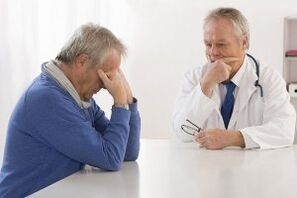According to statistics, about a third of men after the age of thirty suffer from prostatitis and almost half after the age of fifty.

Perhaps the real situation is a little different, as there is asymptomatic prostatitis (chronic form). Another problem is that many people are just shy or afraid to report their symptoms to the doctor.
The prostate gland is a very important organ of the male body: it is responsible for the production of a special secretion that mixes with the sperm and maintains normal and healthy sperm activity, as well as the resistance of the sperm to negative facts and conditions.
Symptoms of prostatitis in men
What are the symptoms of prostatitis in men? Common signs of prostatitis in men:
- Power issues.
- Development of nervous disorders.
- Sickness.
- The pain in the perineum, groin and pubic area is short-lived and passes quickly.
- The presence of discharge from the urethra (most often in the morning), resembling the appearance of white scales.
Below you will learn about the symptoms of prostate inflammation in men.
More for everyone
How does prostatitis manifest in men? The first signs of inflammation of the prostate in men are frequent urination.
The urge to urinate increases at night and during the day. The process of urination is accompanied by painful sensations ("as if cutting") in the lower abdomen. The painful sensation can become chronic and occur not only during urination. Frequent urination along with painful sensations often indicates chronic prostatitis.
Manifestations of prostatitis in men include a feeling of constant fullness of the bladder.
After completing the act, the feeling remains that the bladder is still full. Increases irritability and self-doubt. It can occur in both forms of the disease. It requires seeking medical attention, as the extreme development of this symptom is urinary retention in prostatitis.

Blood in the urine with prostatitis is a rare symptom. Can point to:
- development of purulent and inflammatory processes;
- for trauma;
- for prostatitis with complication - hyperplasia (a separate disease characterized by an increase in the number of structural elements of the tissues, excessive cell formation, treated separately).
Increased fatigue is a consequence of the disease. First, in the absence of treatment, the body compensates for the disease itself, which is reflected in mental resources.
Increased irritability and fatigue, as well as depression.
More often it develops in a chronic form.
Painful sensations in the perineum and scrotum.
Increases if left untreated. It develops in both chronic and acute forms.
Sexual dysfunction. Erection worsens and "disappears", the duration of sexual intercourse is significantly reduced. Spontaneous morning erections also disappear. This is an indirect sign, often showing a chronic form.
Difficulty during defecation - possible painful sensations in the rectum during defecation, discharge of pus. He talks about the acute form.
Excessive sweating indicates a chronic form of the disease. Sweating is often seen in the perineal area. It can go "together" with emotional disorders (a consequence of anxiety and psychogenic factors).
Constipation with prostatitis is also a symptom. How to recognize prostatitis? If you find such symptoms, it is better to contact a specialist who will make the correct diagnosis.
Consider acute and chronic prostatitis and signs of prostate inflammation in men.
Sharp form
How prostatitis affects men - symptoms:
- Feeling of general weakness and severe malaise.
- Body temperature is one of the symptoms of prostatitis, followed by headache.
- Symptoms of prostatitis pain (in the perineum), which increases with urination and defecation.
- Often a desire to go to the toilet, which is not satisfying - the bladder is not completely emptied.
- This in turn increases irritability and nervous irritability. In clinical cases, acute urinary retention may develop.
Chronic form
The course, as a rule, is asymptomatic, one practically does not present complaints (or may not be aware of them).

Significant signs of the disease are almost never observed.
If you do not understand the manifestations of prostatitis, the symptoms, the disease, despite its spread, is considered "shameful".
A person who experiences general malaise, urinary problems, may simply "not notice" these symptoms and not give them due importance.
PSA levels may be elevated in chronic prostatitis, but not always. There are many cases where tests of men with chronic prostatitis show PSA levels within normal limits. Chronic prostatitis is often not detected.
In the initial stage, prostatitis in men manifests itself as a mild form of acute inflammation of the prostate gland, ie the development of inflammation after the penetration of bacteria into the prostate gland through certain channels, for example through the urethra.
Given that chronic prostatitis is a rather sluggish disease, the immune system opposes the onset of an acute inflammatory process.
Due to the fact that the inflammation is not completely cured, a permanent inflammatory process remains in the prostate gland, which becomes chronic and thus can cause the formation of scars in the prostate gland at the site of inflammation.
Larger scars can lead to prostate dysfunction. As with acute prostatitis, chronic prostatitis can be detected by the following symptoms:
Symptoms of inflammation of the prostate in men (chronic form):
- Shrinkage and pain in the perineum and genitals.
- Painful ejaculation.
- Pain in the bladder.
- Pain and burning during or after urination.
- Painting pain and groin pain.
- Increased urge to urinate.
- Erectile dysfunction.
Clinical presentation and development
Signs of prostatitis in men indicate that a doctor should be consulted urgently. Which doctor should I go to for prostatitis? Read more here.
The course of the inflammatory process leads to narrowing of the lumen of the urethra and irritation of the nerve endings, which is expressed in a violation of the process of urination (as you know, this often happens at night several times a night, urination is carried out "in smallportions ", there is no feeling of satisfaction, which the bladder is completely empty).
Inflammation of the prostate gland, if started in time, does not lead to disorders in the genital area. If the inflammatory process has developed sufficiently: libido is inhibited, infertility may develop, the risk of secondary urinary tract infections increases and chronic renal failure may develop.
What else can events talk about?
Sexual dysfunction as a separate symptom or together with sweating can be a symptom of a nervous disorder. For example, chronic stress.

Some of our diseases are really nerves.
Sexual dysfunction, by the way, most often has a nervous basis and the cause lies in the psyche.
In this case, a consultation with a psychologist or psychotherapist is required, usually more than one.
It is important to know: if we are talking about sexual dysfunction on a nervous basis, then it should be borne in mind that in this case there will be no inflammation or fever and no discharge.
Diagnosis should begin with a physician. You should definitely start with a trip to a psychologist when sexual dysfunction is the only symptom (and even then you may be advised to apply for the necessary tests and see a doctor).
An unambiguous diagnosis can only be established by a doctor after examination and passing the necessary tests. First of all, the presence of discharge or inflammation speaks of sexually transmitted diseases.
All these diseases can be distinguished only by the results of clinical blood tests, smears. And for each disease can be created its own drug treatment program (for example, a course of antibiotics).
Who should I contact?
How to check for prostatitis? The examination should begin with a urologist and andrologist.
During rehabilitation activities (after the main treatment) it is recommended to visit a physiotherapist, physiotherapist and psychologist to normalize the patient's state of mind.
You should listen carefully to the recommendations of a specialist, if treatment is prescribed, strictly follow it. Do not forget about the preventive measures that will be appropriate after the end of treatment.
Conclusion
Now you know what the symptoms of prostatitis in men are. It is advisable to avoid hypothermia, try not to get carried away with spicy and fried foods, alcohol and smoking and have a regular sex life. Do not forget about the prevention of sexually transmitted diseases (first of all, you need to be protected).
Follow your doctor's recommendations. Try to lead, if not a healthy lifestyle, then at least not harmful, do not abuse harmful substances (smoking, alcohol). Do not hesitate to report your complaints to your doctor. If your loved one is ill, provide emotional support.






























